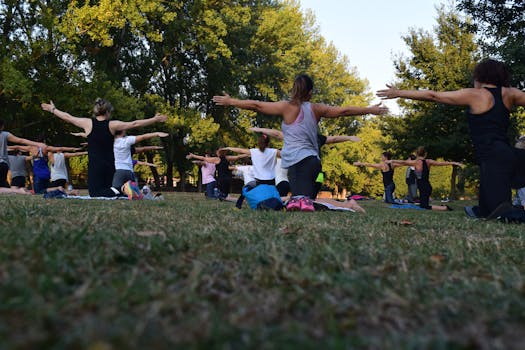Embracing a Balanced Lifestyle: Tips for a Healthier You
Takeaways:
- Understand the importance of balance in life for overall well-being.
- Incorporate healthy habits into your daily routine.
- Practice mindfulness and self-care to enhance mental health.
- Learn how to set achievable goals for personal development.
Living a balanced lifestyle is essential for achieving overall well-being, happiness, and fulfillment. In our fast-paced world, it can be easy to get caught up in work, obligations, and stress, leading to burnout and dissatisfaction. This article will explore various aspects of a balanced lifestyle, including health, wellness, and personal development, providing actionable tips to help you lead a more harmonious life.
The Importance of a Balanced Lifestyle

What is a Balanced Lifestyle?
A balanced lifestyle refers to the ability to manage various aspects of life in a way that promotes health and happiness. This includes striking a proper equilibrium between work and play, social interactions, and self-care. Achieving balance is not a one-time event but a continuous process of adjustment and improvement.
Benefits of a Balanced Lifestyle
- Improved Physical Health: A balanced lifestyle promotes regular exercise, a nutritious diet, and sufficient sleep, leading to better physical health.
- Enhanced Mental Well-Being: Balance helps reduce stress and anxiety, fostering a positive outlook and emotional resilience.
- Stronger Relationships: Prioritizing social connections and emotional well-being enhances personal relationships and leads to a supportive social network.
Identifying Imbalance in Your Life
Recognizing the signs of imbalance is the first step towards achieving a healthier lifestyle. Some common indicators include:
- Constant fatigue or burnout.
- Feelings of anxiety or depression.
- Neglecting social relationships or personal interests.
Incorporating Healthy Habits

Nutrition and Diet
A well-balanced diet is crucial for maintaining energy levels and supporting overall health. Here are some tips for incorporating better nutrition into your daily routine:
- Eat a Variety of Foods: Include fruits, vegetables, whole grains, lean proteins, and healthy fats in your meals.
- Stay Hydrated: Drink plenty of water throughout the day to maintain hydration.
- Plan Meals: Prepare meals ahead of time to avoid unhealthy last-minute choices.
Physical Activity
Regular physical activity is essential for maintaining a healthy lifestyle. It helps manage weight, boosts mood, and reduces the risk of chronic diseases. Here’s how you can incorporate more movement into your life:
- Find Activities You Enjoy: Whether it’s dancing, hiking, or swimming, engaging in enjoyable activities makes exercise feel less like a chore.
- Set Realistic Goals: Start with achievable goals to gradually build your fitness level.
- Make it a Habit: Schedule workouts just like any other important appointment to ensure consistency.
Sleep Hygiene
Quality sleep is often overlooked but is a critical component of a balanced lifestyle. Good sleep hygiene can lead to better mental and physical health. Consider these tips:
- Establish a Routine: Go to bed and wake up at the same time every day.
- Create a Relaxing Environment: Make your bedroom a calming space, free from distractions.
- Avoid Screens Before Bed: Limit screen time at least an hour before sleep to improve sleep quality.
Mindfulness and Self-Care

The Power of Mindfulness
Mindfulness involves being present in the moment and fully engaging with your thoughts and feelings. It can reduce stress and enhance overall happiness. Here are some ways to practice mindfulness:
- Meditation: Spend a few minutes each day meditating to clear your mind and enhance focus.
- Deep Breathing: Practice deep breathing exercises to calm your mind and reduce anxiety.
- Gratitude Journaling: Keep a journal to note things you are grateful for each day to foster a positive mindset.
Self-Care Practices
Self-care is about taking time for yourself to recharge and rejuvenate. Incorporate self-care into your routine with these strategies:
- Schedule Downtime: Make time for relaxation and activities you enjoy.
- Engage in Hobbies: Pursue interests and hobbies that bring you joy and fulfillment.
- Seek Support: Don’t hesitate to reach out to friends, family, or professionals when you need help.
Setting Boundaries
Setting healthy boundaries is crucial for maintaining balance in your life. Here’s how to do it effectively:
- Learn to Say No: Protect your time and energy by declining commitments that do not serve your well-being.
- Communicate Your Needs: Be open with others about what you need for your mental and emotional health.
- Limit Digital Distractions: Set boundaries around technology use to reduce stress and increase focus.
Personal Development

Setting Achievable Goals
Setting goals gives you something to strive for and provides direction in life. Here’s how to set achievable goals:
- Use the SMART Criteria: Ensure your goals are Specific, Measurable, Achievable, Relevant, and Time-bound.
- Break Goals Down: Divide larger goals into smaller, more manageable tasks to avoid feeling overwhelmed.
- Track Your Progress: Regularly review your progress to stay motivated and adjust your strategies as needed.
Continuous Learning
Embrace a mindset of lifelong learning to enhance your skills and knowledge. Here are some ways to incorporate learning into your life:
- Take Online Courses: Explore platforms that offer courses on topics of interest.
- Read Regularly: Make reading a part of your daily routine to expand your knowledge.
- Engage in Workshops: Attend workshops or seminars to learn from experts and network with others.
Building Resilience
Resilience is the ability to bounce back from setbacks and challenges. To cultivate resilience, consider these strategies:
- Develop a Support Network: Surround yourself with positive and supportive individuals.
- Practice Problem-Solving: Strengthen your problem-solving skills to navigate challenges effectively.
- Maintain a Positive Outlook: Focus on solutions rather than problems to foster a resilient mindset.
Conclusion

FAQs
What are some quick tips for achieving a balanced lifestyle?

How can I stay motivated to maintain a balanced lifestyle?
Set clear, achievable goals and track your progress. Surround yourself with supportive individuals and remind yourself of the benefits of living a balanced life.
Is it possible to achieve balance while managing a busy schedule?
Yes, balance can be achieved by prioritizing your time effectively. Schedule self-care and health-related activities just like any other commitments, and learn to say no to unnecessary obligations.






